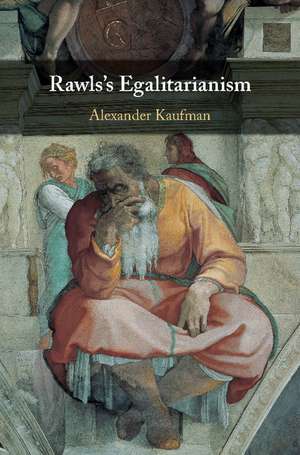Rawls's Egalitarianism
Autor Alexander Kaufmanen Limba Engleză Hardback – 13 iun 2018
| Toate formatele și edițiile | Preț | Express |
|---|---|---|
| Paperback (1) | 284.78 lei 6-8 săpt. | |
| Cambridge University Press – 22 ian 2020 | 284.78 lei 6-8 săpt. | |
| Hardback (1) | 464.93 lei 38-44 zile | |
| Cambridge University Press – 13 iun 2018 | 464.93 lei 38-44 zile |
Preț: 464.93 lei
Preț vechi: 573.98 lei
-19% Nou
Puncte Express: 697
Preț estimativ în valută:
88.97€ • 93.31$ • 74.06£
88.97€ • 93.31$ • 74.06£
Carte tipărită la comandă
Livrare economică 28 martie-03 aprilie
Preluare comenzi: 021 569.72.76
Specificații
ISBN-13: 9781108429115
ISBN-10: 1108429114
Pagini: 280
Dimensiuni: 158 x 235 x 18 mm
Greutate: 0.51 kg
Editura: Cambridge University Press
Colecția Cambridge University Press
Locul publicării:Cambridge, United Kingdom
ISBN-10: 1108429114
Pagini: 280
Dimensiuni: 158 x 235 x 18 mm
Greutate: 0.51 kg
Editura: Cambridge University Press
Colecția Cambridge University Press
Locul publicării:Cambridge, United Kingdom
Cuprins
Introduction: democratic equality: retrieving Rawls's egalitarianism; 1. Rawls's practical conception of justice opinion, tradition and objectivity in political liberalism; 2. Stability, fit, and consensus; 3. Rawls and ethical constructivism; 4. A satisfactory minimum conception of justice reconsidering Rawls's maximin argument; 5. Cohen's ambiguities; 6. Justice as fairness and fair equality of opportunity; 7. Democratic equality; 8. Ideal theory and practical judgment; 9. Poverty, inequality, and justice.
Recenzii
'Kaufman's book is an important contribution to the elaboration of Rawls's theory of distributive justice and its defense against many recent criticisms developed over the past 10–15 years. It should appeal to academic philosophers and political theorists who work on Rawls and on distributive justice more generally, including graduate students and upper level undergraduates.' Samuel Freeman, Avalon Professor of the Humanities, University of Pennsylvania
'This book reflects a deep engagement with the work of John Rawls, and it captures both the general spirit and the details of that theory better than the great majority of commentaries. The most prominent criticisms of Rawls's work - including notably those of G. A. Cohen and Amartya Sen - rely on misunderstandings of the target view, and this manuscript goes a long distance toward explaining how and why that is so. Graduate students in philosophy or political science who are writing on Rawls (or on the particular critics considered here) will do very well to read this book, regardless of whether their own work is ultimately in sympathy with Rawls's work or critical of it. Critics of Rawls would also do well to read this book, since that would enable sharper and more sympathetic treatment of Rawls's views in the presentations of their own criticisms.' Jon Garthoff, University of Tennessee
'… a learned and engaging book, and it will be of interest to scholars of Rawls and political equality. It pays meticulous attention to Rawls's particular arguments while keeping his entire political vision in mind.' Andrius Gališanka, Journal of Moral Philosophy
'This book reflects a deep engagement with the work of John Rawls, and it captures both the general spirit and the details of that theory better than the great majority of commentaries. The most prominent criticisms of Rawls's work - including notably those of G. A. Cohen and Amartya Sen - rely on misunderstandings of the target view, and this manuscript goes a long distance toward explaining how and why that is so. Graduate students in philosophy or political science who are writing on Rawls (or on the particular critics considered here) will do very well to read this book, regardless of whether their own work is ultimately in sympathy with Rawls's work or critical of it. Critics of Rawls would also do well to read this book, since that would enable sharper and more sympathetic treatment of Rawls's views in the presentations of their own criticisms.' Jon Garthoff, University of Tennessee
'… a learned and engaging book, and it will be of interest to scholars of Rawls and political equality. It pays meticulous attention to Rawls's particular arguments while keeping his entire political vision in mind.' Andrius Gališanka, Journal of Moral Philosophy
Notă biografică
Descriere
A new analysis of John Rawls's theory of distributive justice, focusing on the ways his ideas have both influenced and been misinterpreted by the current egalitarian literature.
